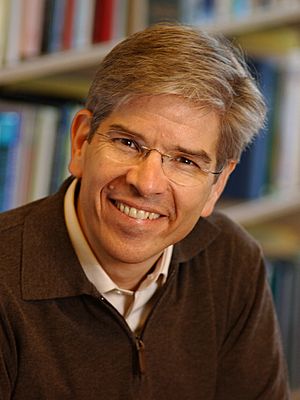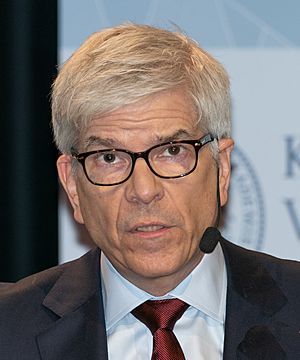Paul Romer facts for kids
Quick facts for kids
Paul Romer
|
|
|---|---|

Romer in 2005
|
|
| Chief Economist of the World Bank | |
| In office October 2016 – January 24, 2018 |
|
| President | Jim Yong Kim |
| Preceded by | Kaushik Basu |
| Succeeded by | Shanta Devarajan (Acting) |
| Personal details | |
| Born |
Paul Michael Romer
November 6, 1955 Denver, Colorado, U.S. |
| Education | Phillips Exeter Academy University of Chicago (SB, PhD) Massachusetts Institute of Technology Queen's University |
| Awards | Nobel Memorial Prize in Economic Sciences (2018) |
| Scientific career | |
| Fields | Economics |
| Institutions | New York University Stanford University UC Berkeley University of Chicago University of Rochester |
| Thesis | Dynamic competitive equilibria with externalities, increasing returns and unbounded growth (1983) |
| Doctoral advisor | José Scheinkman Robert Lucas Jr. |
| Other academic advisors | Russell Davidson Ivar Ekeland |
| Doctoral students | Sérgio Rebelo Maurice Kugler |
Paul Michael Romer, born on November 6, 1955, is an American economist. He is currently a professor of finance at Boston College. Romer is widely known for being the former Chief Economist of the World Bank. He also shared the 2018 Nobel Memorial Prize in Economic Sciences with William Nordhaus. This award was given for his important work on "endogenous growth theory." This theory explains how new ideas and technology help countries grow richer over time. Romer also created the term "mathiness," which he uses to describe when mathematics is used in a confusing way in economic studies.
Before joining Boston College, Romer taught at several universities. These included NYU, the University of Chicago, and Stanford University. He was the chief economist and senior vice president of the World Bank. He left this role in January 2018 after a disagreement. This disagreement was about how Chile's "ease of doing business" ranking was calculated. After leaving the World Bank, he returned to NYU.
Contents
Early Life and Education
Romer was born to Roy Romer and Beatrice "Bea" Miller. His father was a former governor of Colorado. Paul Romer has four brothers and two sisters. One of his brothers, Chris Romer, used to be a state senator in Colorado.
He finished high school in 1973 at Phillips Exeter Academy. He later earned two degrees from the University of Chicago. He received his Bachelor of Science in mathematics and his PhD in economics in 1983. Before that, he also studied at the Massachusetts Institute of Technology and Queen's University in Canada.
Career Highlights
Romer's most important work focuses on how economies grow. He made big contributions to developing "endogenous growth theory." This theory suggests that economic growth comes from within a country. It is driven by things like new ideas, research, and human capital. In 1997, Time magazine named him one of America's 25 most influential people. He also received the Horst Claus Recktenwald Prize in Economics in 2002.
Teaching and Research
Romer's research on economic growth built on earlier studies. His 1983 PhD paper showed how new technology can come from people's actions. This includes things like research and development. This work led to his famous articles in the Journal of Political Economy. These articles, published in 1986 and 1990, helped start the field of endogenous growth theory.
Romer taught at many universities. These include the University of Rochester, the University of Chicago, and Stanford University. At New York University, he started the Marron Institute of Urban Management. This institute helps cities plan their future. It aims to make cities safer, healthier, and easier to get around for people.
Starting a Business
In 2001, Romer took a break from teaching. He started a company called Aplia. This company created online homework problems for college students. Students submitted billions of answers on the Aplia website. In 2007, another company, Cengage Learning, bought Aplia.
Romer is famous for saying, "A crisis is a terrible thing to waste." He said this in 2004, talking about how other countries were improving their education faster than the United States. This quote later became a popular idea for economists. It meant that difficult times can also be chances to find new solutions.
Ideas for Charter Cities
Romer has explored the idea of "charter cities." He believes these cities could help developing countries grow economically. He talked about this idea in a TED talk in 2009. He argued that new rules and better ways of governing could help poorer nations grow faster. In his idea, a country would let a more developed country manage a special "charter city." This would allow new rules to be tested. People could then choose to live in these cities if they liked the new rules.
The government of Honduras considered creating such cities. However, they did not include the oversight of a third-party government. Romer was part of a "transparency committee" for this project. He resigned in September 2012. This happened when the Honduran government signed agreements with developers without involving his committee.
Role at the World Bank
Romer became the World Bank Chief Economist in October 2016. He resigned on January 24, 2018. This followed an interview where he suggested that Chile's "ease of doing business" ranking might have been changed for political reasons. This claim was denied by the former World Bank economist who worked on Chile's ranking.
Nobel Memorial Prize in Economics
Paul Romer shared the 2018 Nobel Prize with William Nordhaus. The Royal Swedish Academy of Sciences chose Romer for showing "how knowledge can function as a driver of long-term economic growth." They noted that earlier studies did not show how economic decisions lead to new technologies. Romer solved this by showing how economic forces encourage companies to create new ideas and inventions.
After winning the prize, Romer explained his thoughts on growth and innovation. He said he wondered why progress was "speeding up over time." He realized this happens because ideas are special. If one person discovers something, everyone can use that idea. On the same day he received the award, Romer married Caroline Weber. She is a professor of French Literature.
Political Views
In June 2024, 16 Nobel Prize winners in Economics, including Romer, signed an open letter. They argued that certain economic policies could cause inflation in the United States. They were referring to policies of Donald Trump and efforts to limit the independence of the Federal Reserve.
See also
 In Spanish: Paul Romer para niños
In Spanish: Paul Romer para niños
- Endogenous growth theory
- Good governance
- Special economic zone
- Mathiness
 | Frances Mary Albrier |
 | Whitney Young |
 | Muhammad Ali |


